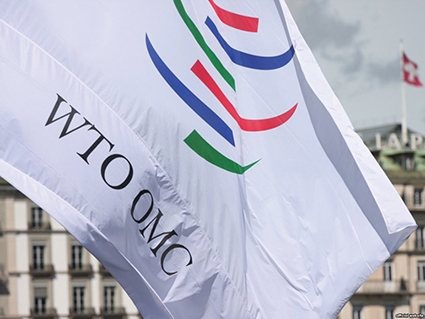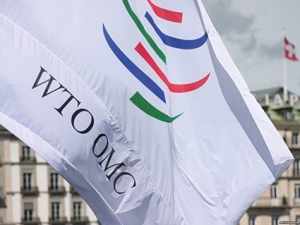Dechert OnPoint: Georgia and the WTO
Dechert Georgia, through the contribution of partners Archil Giorgadze and Nicola Mariani, joined by senior associates Ruslan Akhalaia and Irakli Sokolovski, as well as Ana Kostava and Ana Kochiashvili, is partnering with Georgia Today on a regular section of the paper which will provide updated information regarding significant legal changes and developments in Georgia. In particular, we will highlight significant issues which may impact businesses operating in Georgia.
Dechert’s Tbilisi office combines local service and full corporate, tax and finance support with the global knowledge that comes with being part of a worldwide legal practice.
Dechert Georgia is the Tbilisi branch of Dechert LLP, an international specialist law firm that focuses on core transactional and litigation practices, providing world-class services to major corporations, financial institutions and private funds worldwide. With more than 900 Lawyers in our global practice groups working in 27 offices across Europe, the CIS, Asia, the Middle East and the United States, Dechert has the resources to deliver seamless, high quality legal services to clients worldwide. For more information, please visit www.dechert.com or contact Nicola Mariani at nicola.mariani@dechert.com.
Georgia and the WTO
Georgia has been a member of the World Trade Organization (“WTO”) since 14 June 2000. It was the fourth former Soviet republic to join the organization, following Kyrgyzstan, Latvia and Estonia.
As a member, Georgia is bound by the WTO acquis in its entirety. In essence, the acquis is comprised of the Annexure to the Marrakesh Agreement (the “Annexure”), the founding agreement of the WTO. The Annexure encompasses: (i) the General Agreement on Tariffs and Trade (“GATT”); (ii) the General Agreement on Trade in Services (“GATS”); (iii) the Agreement on Agriculture; (iv) the Agreement on Sanitary and Phytosanitary Measures (“SPS”); (v) the Agreement on Technical Barriers to Trade (“TBT”); (vi) the Agreement on Trade Related Investment Measures (“TRIMS”); (vii) the Anti Dumping Agreement; (viii) the Agreement on Subsidies and Countervailing Measures (“SCM”); and (ix) the Agreement on Trade Related Aspects of Intellectual Property Rights (“TRIPS”), among others. As a member of the WTO, Georgia is subject to the jurisdiction of the WTO Dispute Settlement Mechanism and Dispute Settlement Body (“DSB”).
This week’s edition of OnPoint provides a brief overview of Georgia’s principal obligations under the WTO acquis and the WTO’s most recent Trade Policy Review (“TPR”) of Georgia, which was held at the WTO headquarters in Geneva on 19-21 January 2016.
Prominent WTO Obligations
The most important obligations of WTO members, which serve as the basis of the acquis, are the institutions of non-discrimination between foreign trade partners and between foreign and domestic trade, as enshrined in the Most-Favored Nation (“MFN”) and National Treatment (“NT”) principles. The MFN principle provides that when one WTO member is granted a special favor (such as a lower customs duty rate for one of its products), that same treatment must be granted to all other WTO members. Some exceptions are allowed. For example, countries can set up free trade agreements applying only to goods traded within the group. This can include discriminating (in relative terms) against goods from outside the group. Members can also grant developing countries special access to their markets, among other things.
By virtue of the NT principle, imported and locally-produced goods should be treated equally — at least after the foreign goods have entered the market. The same principle should apply to foreign and domestic services, foreign and local trademarks, copyrights and patents. NT, however, only applies once a product, service or intellectual property item has entered the market. Therefore, charging customs duties/tariffs on an import is not a violation of the NT principle even if locally-produced products are not charged an equivalent tax.
Other main obligations include the passage and application of strict anti-dumping policies, limiting subsidization of all and any sectors of trade (in principle), removing all technical barriers to trade and introducing food safety measures in line with the SPS Agreement, among others.
Upon accession to the WTO each country is bound to make a series of commitments on tariffs on goods and services, which are attached as Market Access Schedules (“Schedules”) to the relevant Accession Protocol. The Schedules are not simply announcements regarding tariff rates. They entail the commitment not to increase tariffs above the listed rates — the tariff rates are “bound.” WTO members have also made individual commitments under GATS stating which of their services sectors they are willing to open to foreign competition, and precisely how open those markets are. In general, Georgia’s Tariff and Services Schedules are both considered to be generous. However, there are certain exceptions and limitations to the commitments prescribed. For example, Georgia’s Services Schedule provides that any organization in which a government’s ownership share exceeds 25% has no right to participate as a buyer in the privatization process of Georgia.
2016 Trade Policy Review
The TPR mechanism’s purpose is to improve transparency, generate greater understanding of the policies adopted by member countries and to assess the impact of relevant policies. Many members also view the review process as a means to receive constructive feedback on their policies. Only two TPRs have occurred since Georgia’s accession to the WTO. One occurred in 2009 and another on 19-21 January 2016. At the most recent TPR, WTO members commended Georgia for its open, transparent and predictable trade and investment regimes.
The TPR Report highlighted that Georgia’s customs procedures had been further simplified and that the MFN tariff rate of 2% was one of the lowest in the world, while almost 80% of Georgia’s imports were duty free. It noted that Georgia has undertaken an impressive range of reform initiatives aimed at streamlining, liberalizing and simplifying trade regulations and their implementation, resulting in a relatively healthy GDP growth rate, an impressive international ranking in terms of ease of doing business, and prudent macroeconomic policies. WTO members participating in the review, however, recognized that recently reduced exports and remittances have led to increasing external vulnerability. Furthermore, structural reforms are required to strengthen Georgia’s resilience to shocks, attract additional foreign direct investment, diversify Georgia’s industrial production, increase productivity and increase exports, thereby sustaining economic growth.
The TPR noted that reforms to Georgia’s trade and investment regime have been largely driven by the Government’s commitment to align its legislative and regulatory framework with that of the European Union (“EU”). Some WTO members have stressed the necessity to ensure WTO-consistent implementation of the commitments included in Georgia’s Deep and Comprehensive Free Trade Agreement with the EU signed in 2014.
A number of areas for potential improvement were highlighted at the TPR. Notably, in the area of food safety, members were interested in further discussing how Georgia could ensure that its regulatory system would be implemented according to WTO obligations in the SPS Agreement, which calls on WTO members to base their regulations on international standards and scientific principles. Also at the SPS, Georgia was encouraged to further advance its regulatory framework and infrastructure for animal health control as well as to improve efficiency, hygiene and quality standards in agro-processing. Other areas where the WTO required further information and discussion included the issue of auctions for spectrum allocation in telecommunications, aspects of the new Tax Code affecting investors in Georgia and technical issues regarding the launch of an e-visa portal for tourists wishing to visit Georgia.
* * *
Note: this article does not constitute legal advice. You are responsible for consulting with your own professional legal advisors concerning specific circumstances for your business.











